Understanding Sikh Cremation Practices in the UK
May 25, 2025
Being around the Sikh community in the UK opens your eyes to something special. Sikh funeral customs mix respect, spirituality, and celebration. They believe in the soul's journey to Waheguru, a divine figure, after death. This view turns a sad goodbye into a loving celebration of freedom from the physical world. By learning about these customs, we show respect. We also help grieving families find comfort and closure.
Key Takeaways
- Sikh cremations reflect a belief in the soul's immortality.
- Cremation is seen as a step towards divine union, not an end.
- Embracing these customs fosters respect and understanding.
- Sikh funeral traditions include ceremonies and prayers.
- Sikhism encourages celebrating the soul's return to Waheguru.
Overview of Sikh Cremation Beliefs
Sikhism values spiritual traditions about death. Cremation is key in Sikh final rites. It shows the soul's trip to the divine, called Waheguru. These beliefs show the strong devotion Sikhs have to life's endless cycle.
Significance of Cremation in Sikhism
Cremation in Sikhism is more than just dealing with the dead body. It's a vital ritual filled with deep spiritual meaning. Sikh cremation beliefs aim to help the soul return to Waheguru. It reflects on life's cycle of being born, living, and then being reborn. The act is meant to join the soul with divine light and show that our physical form is temporary.
Comparison with Other Funeral Practices
Cremation in Sikhism is different from other religions. For example:
- Christianity: Burials are common, keeping the body for a future resurrection.
- Hinduism: Cremation is common too, but there are detailed rites, like putting ashes in sacred rivers.
This shows how Sikh final rites and cremation beliefs are special. They give a meaningful and deeply spiritual end for those who have passed away.
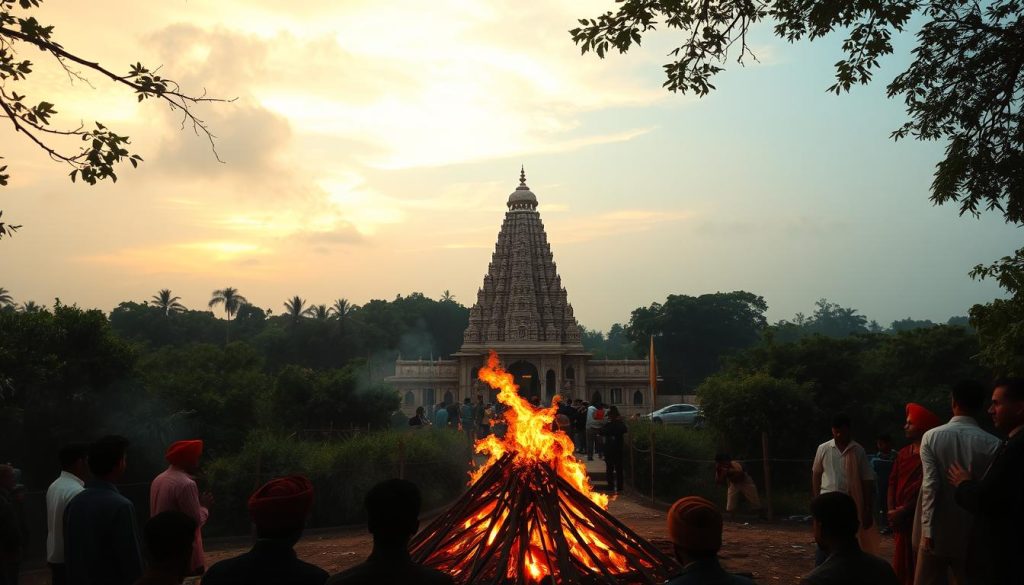
Historical Context of Sikh Cremation
Sikh death rituals come from the teachings of the Sikh Gurus. Funerals are simple and respectful. This shows that everyone is equal in death, no matter their social rank.
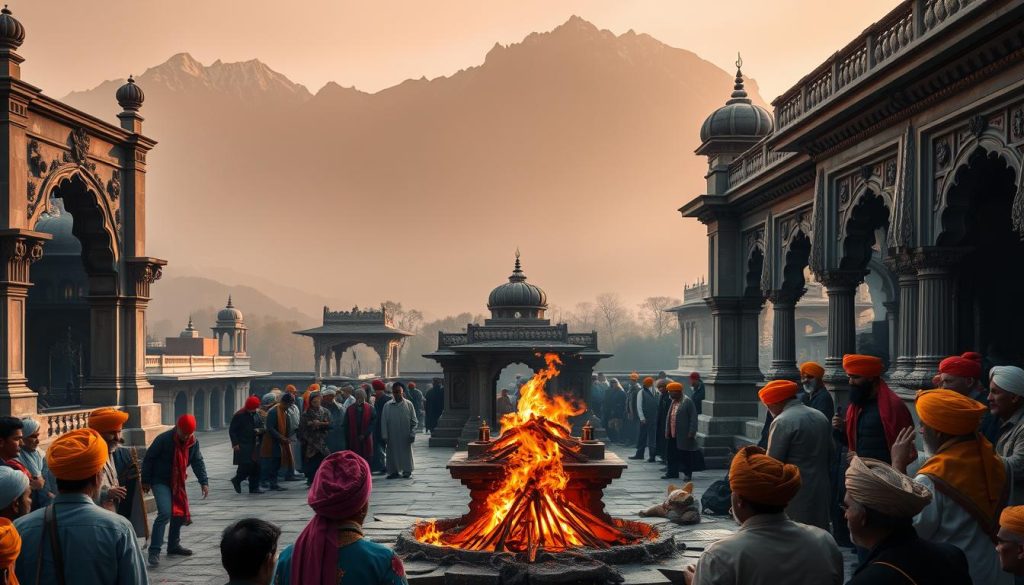
Roots of Sikh Funeral Traditions
Guru Nanak started Sikh funeral customs, followed by other Gurus. He highlighted the importance of humility and simplicity. These rites were simple, focusing on the soul's peaceful journey. They aimed at spiritual freedom, not fancy ceremonies.
Changes Over Time in the UK
When Sikhs moved to the UK, they brought their customs. Over time, these customs changed due to local laws and culture. Yet, Sikh funerals stayed true to their essence. They connect tradition and modernity in the UK.
Legal and Regulatory Framework in the UK
In the UK, there are specific rules for Sikh cremation. These rules help make sure funerals are done right. Sikh families need to know these to follow their faith's cremation customs properly.
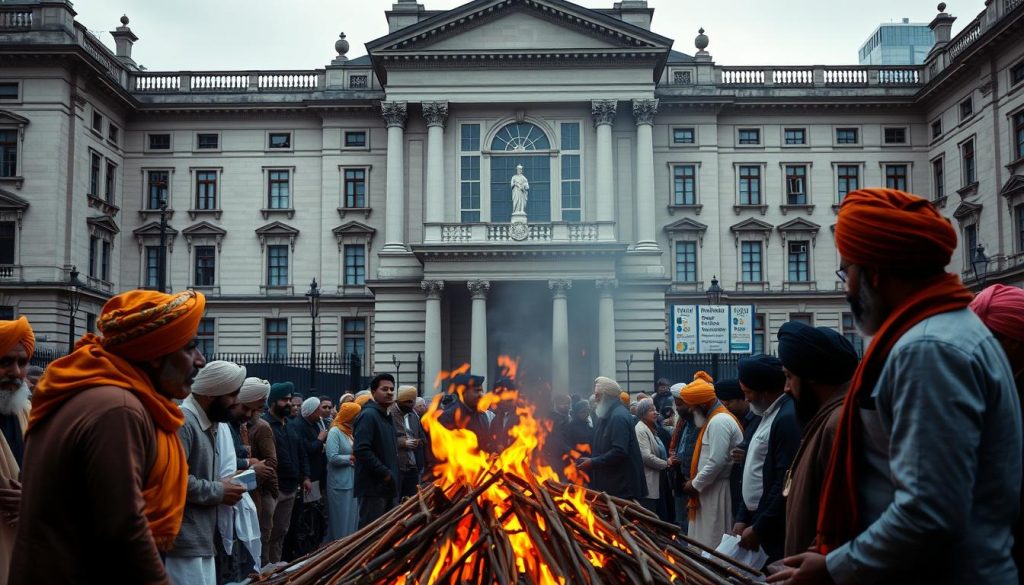
Requirements for Cremation in the UK
For a cremation in the UK, families need to get some important documents. They must also make sure they follow environmental rules and what the local councils say. Doing these things helps respect Sikh cremation laws and gives a rightful goodbye.
Navigating Legalities for Sikh Funerals
Understanding Sikh cremation law UK can be tricky. Families often get help from funeral directors and legal pros. They help mix religious customs with UK laws. This way, families can honor their loved ones and meet legal needs too.
| Key Requirement | Details |
|---|---|
| Cremation Certificate | Must be obtained from the local authority or governing body. |
| Environmental Compliance | Adhere to guidelines on emissions and environmental impact. |
| Religious Observance | Ensure rituals align with both Sikh practices and UK regulations. |
The Cremation Process in Sikhism
The Sikh cremation process is deeply meaningful. It honours the deceased. It supports their journey to the afterlife. This ceremony is solemn and profound. It has steps followed with deep respect and devotion. It's a time for family and community to show love and respect one last time.
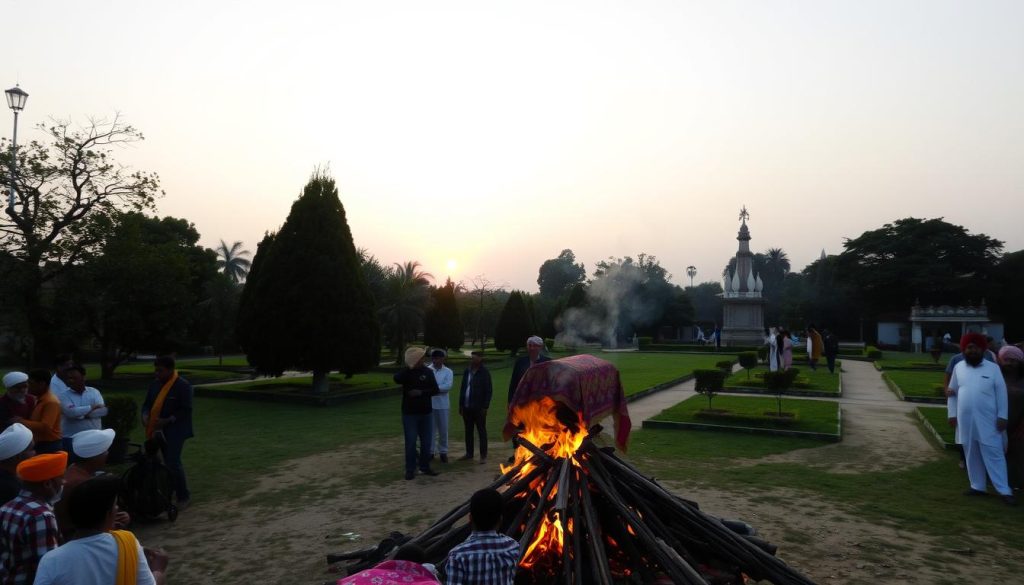
Steps Involved in a Sikh Cremation
We start by washing and dressing the body in a ceremony called “Kafan.” The deceased wears clean, simple clothes. These are often white for purity. Then, prayers are recited. This includes the ‘Ardas’ and verses from the Guru Granth Sahib.
The cremation itself is done with great respect. The body is placed on a pyre. The eldest son or a close male relative lights it. This act symbolises the body's return to nature.
Role of the Family During the Process
The family's role in a Sikh cremation is very important. They are involved in every step. From preparing the body to the final rites, their help is seen as the last service. It guides the soul back to Waheguru.
Family involvement continues after the cremation. They gather for more prayers and hymns. This offers comfort and support. It also strengthens community bonds. Moreover, it helps the family cope with their loss together.
Rituals and Ceremonies Associated with Cremation
Sikh funeral rites are full of tradition and respect for the one who has passed. They include prayers and songs from their holy book, the Guru Granth Sahib. These rituals comfort the family and remind them that the soul never dies.
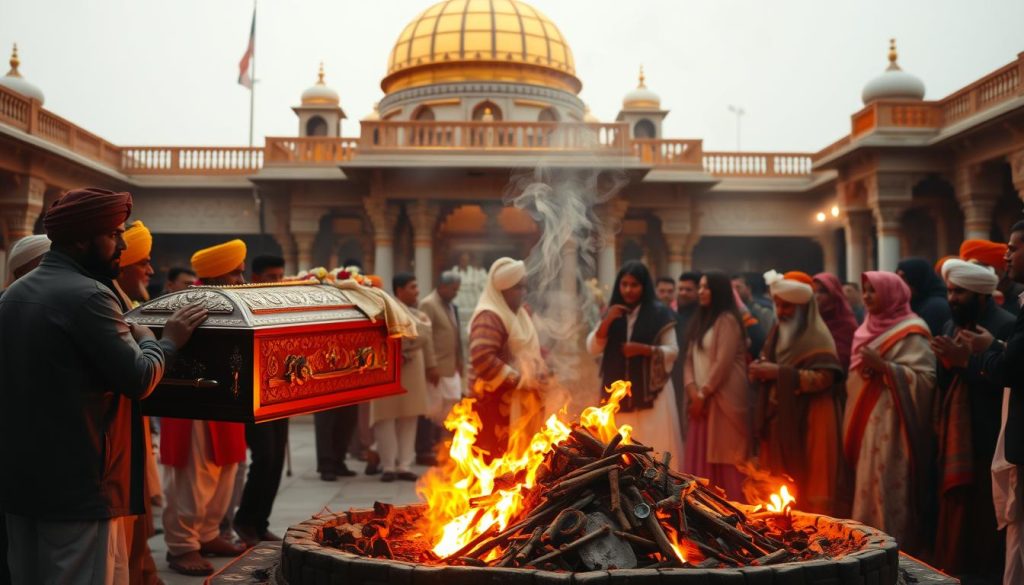
Essential Sikh Funeral Rituals
Reading from the Guru Granth Sahib is key at Sikh funerals. Singing hymns lifts everyone’s mood and helps them find peace. Being together as a community is also very important. It helps everyone remember and support each other.
The Role of Prayers and Hymns
Prayers and hymns are very important during these times. A special prayer, the Kirtan Sohila, may be said. It talks about life being short and the soul living forever. These words help comfort everyone and bring them closer. They honor the person's passage to a peaceful afterlife.
Post-Cremation Practices in Sikh Culture
The end of a Sikh cremation starts several important customs. These customs are full of tradition. They show the Sikh faith’s ideas on life, death, and what comes after.
Immersion of Ashes in Water
Putting ashes in a river is a key Sikh custom after cremation. It shows respect for nature. Rivers like the Ganges in India are very spiritual for these rites. Yet, any flowing water works for this respect. Putting ashes in water also shows the soul moving towards freedom and joining the Almighty.
Commemorating the Deceased
After the ashes are scattered, Sikhs do special things to remember the person who died. They read the Guru Granth Sahib non-stop for about 48 hours. This reading is important. It keeps a spiritual bond and prays forever for the soul.
Families also gather to sing hymns and say sacred verses. These gatherings help the family feel supported. They also celebrate the person’s life. They remind everyone about kindness and shared humanity which are key in Sikhism.
Cultural Variations in Sikh Cremation
The rich tapestry of Sikh cremation practices in the UK is a testament to the dynamic nature of regional Sikh funeral traditions. Cultural variations are evident as communities adapt their rituals, blending tradition with contemporary elements. These variations ensure that each funeral uniquely honours the deceased while respecting familial and regional influences.
Differences within Sikh Communities
Within Sikh communities in the UK, there are noticeable differences in the way cremation ceremonies are conducted. Some families might adhere strictly to the traditional rites, which include specific prayers, hymns, and rituals that are performed before and after cremation. Others may incorporate modern practices, such as eco-friendly cremations, or adapt their ceremonies based on logistical considerations.
Influence of Regional Practices
Regional Sikh funeral traditions greatly influence cremation practices. For instance, Sikh communities from Punjab might follow a set of rituals distinct from those practiced by Sikhs originating from other regions of India. These practices can be modified further based on local customs and the resources available in the UK, showcasing a beautiful blend of cultural variations.
| Traditional Elements | Contemporary Adaptations |
|---|---|
| Prayers and Hymns | Eco-friendly Cremations |
| Ritualistic Fire Lighting | Use of Modern Tech in Services |
| Ceremonial Gatherings | Hybrid Ceremonies |
The Role of Gurdwaras in Funeral Services
In Sikh culture, Gurdwaras are key for funeral services. They offer a special and shared place where ceremonies happen. This ensures traditions are respected and followed.
Organising Cremations and Services
Sikh funerals usually start and end at the Gurdwara. The services there involve hymn singing, prayers, and rituals. These aim to help the soul find freedom. Gurdwaras provide full Sikh funeral support. They make the processes smooth and respect Sikh beliefs.
Support Offered to Grieving Families
Gurdwaras give strong support to families in mourning. They create a space for families and the community to gather. This offers comfort. Through seva, people help in preparing and serving langar. This meal brings everyone together, emphasizing equality. It helps families with their loss and shows the Gurdwara's crucial role in giving emotional and spiritual care.
Expert Asian funeral directors in the West Midlands team up with Gurdwaras. They make sure religious ceremonies are done right. This keeps the cultural traditions of the services intact.
| Service | Description |
|---|---|
| Prayer Ceremonies | Hymns and prayers are conducted at the Gurdwara to honour the deceased. |
| Langar | A communal meal served to promote equality and inclusivity. |
| Seva | Community participation in preparing and serving meals, supporting the grieving family. |
Sikh Mourning Practices
Sikh mourning is all about spirituality and being there for each other. It encourages quiet reflection and finding peace in hard times.
Duration and Customs of Mourning
The mourning period in Sikhism goes on for two to five weeks. During this time, families pray together and read the Guru Granth Sahib. These activities bring comfort and help them focus on the soul's journey.
They also serve meals to people, showing the deceased's spirit of kindness and sharing.
Support Systems for Bereaved Families
In Sikh traditions, Gurdwaras and community help are very important. They provide peace for the soul and help for the family. This means the family never feels alone during tough times.
Community members often visit to show they care. This shows how Sikh mourning rituals bring people together.
Current Trends in Sikh Cremation in the UK
In recent years, trends in Sikh funerals in the UK have changed. They mix old practices with new ways because of Britain's diverse cultures. Let's look at these new changes and their effects.
Modern Adaptations in Practices
Sikh funeral rites are still important, but now there's a move towards eco-friendly choices. Choices like biodegradable urns and green crematoriums are popular. These modern Sikh rites show a commitment to both culture and the planet.
Influence of Diverse Cultural Backgrounds
The UK's mix of cultures has changed Sikh funeral traditions. This mix promotes sharing and learning between cultures. It leads to new ways in trends in Sikh funerals.
| Aspect | Traditional Practices | Modern Adaptations |
|---|---|---|
| Urns | Metal or Ceramic | Biodegradable Materials |
| Crematoriums | Standard Facilities | Eco-Conscious Facilities |
| Cultural Practices | Strict Adherence | Blended Traditions |
These changes show respect for old beliefs and new ways. As Sikh funeral trends evolve, the community respects its roots while meeting today's needs.
Challenges Faced by Sikh Families
Sikh families in the UK face Sikh funeral challenges due to cultural sensitivity. They try to keep traditional Sikh funeral practices alive. At the same time, they respect the UK's diverse culture. This requires understanding and being able to change.
Navigating Cultural Sensitivities
Telling others about Sikh traditions is a big challenge. It helps keep these practices respected. It also helps more people understand and accept them. Talking about cultural sensitivity is important. It ensures friends and neighbours respect Sikh funerals.
Addressing Grief and Loss in a Diverse Society
Grieving is complex in a diverse society. Sikh families may not always find support familiar with their customs. They often look for comfort within their community. But they also meet outside expectations. Finding a balance between their culture and the UK's diversity is key.
Resources and Support for Sikh Families
Sikh families in the UK have many resources and support services during times of loss. These help with cultural needs and practical help. They make sure families follow their traditions and care for their feelings.
Local Sikh Communities and Organisations
UK Sikh communities give strong support systems. Gurdwaras offer places for comfort and help with faith. Sikh Council UK and NishkamSWAT help with funerals and give advice.
Available Grief Support Services in the UK
There are also non-religious groups that help with grief. Cruse Bereavement Support and Grief Encounter have counsellors trained in Sikh ways of mourning. They offer professional and caring help to Sikh families during hard times.
FAQ
What is the significance of cremation in Sikhism?
How does Sikh cremation compare with other funeral practices?
What are the roots of Sikh funeral traditions?
How have Sikh cremation practices changed over time in the UK?
What are the legal requirements for cremation in the UK?
How do Sikh families navigate legalities for funerals?
What steps are involved in a Sikh cremation?
What is the role of the family during a Sikh cremation?
What are the essential Sikh funeral rituals?
How do prayers and hymns play a role in Sikh funerals?
What happens to the ashes after a Sikh cremation?
How are the deceased commemorated in Sikh traditions?
Are there cultural variations in Sikh cremation practices?
How do regional practices influence Sikh cremation?
What role do Gurdwaras play in organising Sikh funerals?
How do Gurdwaras support grieving families?
What are the customs and duration of Sikh mourning?
How do Sikh families receive support during mourning?
How are Sikh cremation practices adapting to modern times in the UK?
What influences are shaping current Sikh cremation practices?
What challenges do Sikh families face regarding funeral practices?
How do Sikh families address grief and loss in a multicultural society?
What resources and support are available for Sikh families in the UK?
Where can Sikh families find grief support services in the UK?
Providing generations of care, with tradition trust and guidance
Locations We Cover
Aldridge | Bilston |Birmingham | Blackheath | Bloxwich | Brierley Hill | Brownhills | Coseley | Coventry | Darlaston | Dudley | Halesowen | Kingswinford | Oldbury | Rowley Regis | Royal Sutton Coldfield | Sedgley | Smethwick | Solihull | Stourbridge | Sutton Coldfield | Tipton | Walsall | Wednesbury | West Bromwich | Willenhall | Wolverhampton
17 Liskeard Road
Park hall
West Midlands
WS5 3EY
01922 438503

